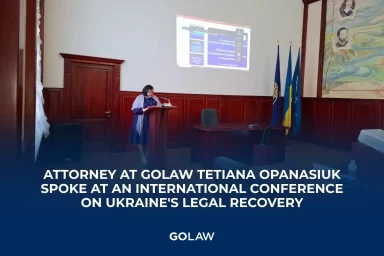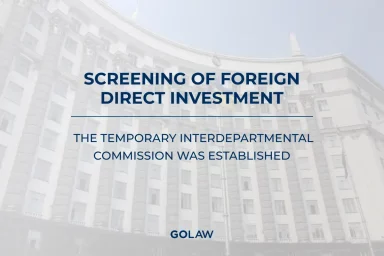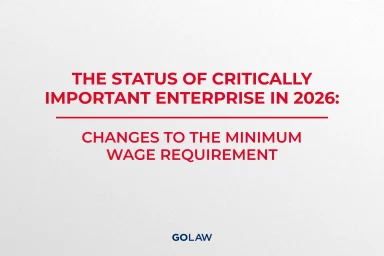NBU eases foreign exchange restrictions: what resolution No. 95 has changed for businesses and investors
Contents
On 5 August 2025, the National Bank of Ukraine adopted resolution No. 95, which significantly amends the rules on foreign exchange operations for corporate clients and foreign investors.
Key changes in foreign exchange regulation
Resolution of the NBU board No. 95 of 5 August 2025 marks another step is easing the wartime foreign exchange restrictions introduced by resolution No. 18 of 24 February 2022. The new rules are aimed at stimulating investment and increasing the foreign exchange flexibility of Ukrainian businesses, while maintaining the necessary control mechanisms.
Dividend repatriation
One of the most important innovations concerns the payment of dividends abroad. Residents will now be able to partially repatriate dividends for the period of activity starting from 1 January 2023. The monthly limit of EUR 1 million remains unchanged.
According to the NBU, the current overall limit prevents a significant increase in demand for foreign currency, while allowing dividend repatriation will strengthen foreign investors’ confidence and stimulate the inflow of new capital into Ukraine. Funds transferred abroad in the form of dividends may also be used for other purposes, including repayment of debt obligations.
New risk management instruments
Resolution No. 95 considerably expands the possibilities for forward transactions.
First, clients are now entitled to sell foreign currency to banks for hryvnia on forward terms without the need for physical delivery of the underlying asset.
Second, residents are permitted to purchase foreign currency from a bank on a forward basis for the purpose of hedging exchange rate risks in import transactions. At the same time, restrictions have been set for banks: they may not increase their net long foreign currency position, so such forward transactions are possible only within the amount of currency the bank has itself purchased on a forward basis from its clients.
These innovations provide corporate clients with more tools to manage currency risks but also require the establishment of internal accounting and control for forward contracts.
Simplification of international settlements
Following the amendments, residents and non-residents may return erroneously credited foreign currency funds within three working days of the bank receiving the relevant notice. This increases the confidence of foreign partners, as their funds will not be blocked without the possibility of return.
The establishment of a three-day period for returning erroneously credited foreign currency significantly improves the predictability of foreign exchange operations and reduces reputational risks for banks. This change sends an important signal to foreign partners about the normalisation of foreign exchange regulation and alleviates concerns about the “freezing” of assets in the event of technical errors.
Greater flexibility in servicing external credits
The approach to servicing external borrowings has been substantially revised. Now, under loans from a pool of foreign creditors, enterprises may repay debt not only in favour of IFIs but also to other participants, namely first-tier banks with a rating of at least “A”.
This change creates greater flexibility for Ukrainian enterprises in structuring external debt and may contribute to diversifying funding sources, potentially reducing the cost of borrowing through competition, and simplifying debt repayment procedures.
At the same time, the imposition of strict rating requirements may limit the range of available banks, especially under martial law, when bank ratings may be downgraded due to war-related risks.
Conclusions
NBU resolution No. 95 is an important step in the liberalisation of foreign currency regulation, providing businesses with more management. The innovations are particularly beneficial for companies with foreign investors and those actively operating in international markets.
However, successful use of the new opportunities requires careful planning, compliance with documentation requirements, and regular monitoring of regulatory changes. Companies should promptly adapt their internal processes to fully benefit from the liberalisation of foreign currency restrictions.

Oleksandr Melnyk
Partner, Head of Corporate Law and M&A practice, Attorney at law
- Contacts
- 31/33 Kniaziv Ostrozkykh St, Zorianyi Business Center, Kyiv, Ukraine, 01010
- o.melnyk@golaw.ua
- +38 044 581 1220
- Recognitions
- Lexology Index: Client Choice 2026
- The Legal 500 2025
- IFLR1000 2025 (International Financial Law Review)
- Legal 500 Green Guide 2024
- 50 Leading Law Firms Ukraine 2026

Oles Riabchuk
Senior Associate, Attorney at Law
- Contacts
- 31/33 Kniaziv Ostrozkykh St, Zorianyi Business Center, Kyiv, Ukraine, 01010
- o.riabchuk@golaw.ua
- +38 044 581 1220
Get in touch
To get a consultation, please fill out the form below or call us right away:Related insights

19 February 2026 Legal news
Attorney at GOLAW Tetiana Opanasiuk spoke at an international conference on Ukra...

13 February 2026 Legal news
Screening of foreign direct investment: the temporary interdepartmental commissi...

27 January 2026 Legal news
The Status of Critically Important Enterprise in 2026: Changes to the Minimum Wa...
Sign up to be aware
New achievements are inspired by information. GO further, don’t miss out GOLAW news and legal alerts
Our expertise
-
- Energy and Natural Resources
- Antitrust and Competition
- Banking and Finance
- Compliance, Corporate Governance and Risk Management
- Corporate and M&A
- Criminal and White Collar Defence
- Defense in Anti-corruption procedures and regulations
- Digital Economy Practice
- Labor and Employment
- Natural Resources and Environment
- Government Relations (GR)
- Insolvency and Corporate Recovery
- Intellectual property
- International trade
- Legal support of business and private Сlients in Germany
- Litigation and dispute resolution
- Private clients
- Real Estate and Construction
- Restructuring, Claims and Recoveries
- Martial Law
- Tax and Customs
-
- Agribusiness
- Aviation
- Chemical industry
- Engineering, Construction and Building Materials
- Environment and Natural Resources
- Financial institutions
- IT and AI
- Industry and manufacturing
- Healthcare industries, Life sciences and Pharmaceuticals
- Media, Entertainment, Sports and Gambling
- Retail, FMCG and E-Commerce
- Transport and Logistics
We use cookies to improve performance of our website and your user experience.
Cookies policy
Cookies settings




